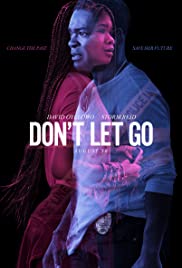
DON’T LET GO
US, 2019, 103 minutes, Colour.
David Oyelowo, Storm Reid, Mykelti Williamson, Alfred Molina, Brian Tyree Henry, Byron Mann, April Grace.
Directed by Jacob Estes.
This is another feature film, touches of horror, made by Limehouse and producer Jason Blum. While working for many years in the horror genre, it was in the latter part of the 2010s that some top directors started to make films for Blumhouse, genre films (like the entertaining Happy Death Day 2U films), Jordan Peele making Get Out and Us, the success of the 2020 remake of The Invisible Man.
This fantasy murder mystery, crime detection, time looping story has the respectability of its central star, David Oyelowo (British stage actor and film star of many films, Selma), playing Jack, a detective, kindly towards his niece Ashley (Storm Reid), his brother being a drug addict and dealer.
The whole family is murdered in their home, Jack hurrying to the scene, suspected by internal affairs and interrogated, wanting to solve the mystery, examining the evidence boxes, to the disapproval of his boss, Alfred Molina. However, he is supported by close friend, Bobby Mykelti Williamson).
The key element of the film is that Ashley phones Jack after the murder, her phone on the table in the room. There have been other twilight zone kinds of stories, especially Frequency with Jim Caviezel and Dennis Quaid as father and son communicating in different time zones. The drama here is that Jack, with the phone calls, tries to guide Ashley away from home so that she will not be killed.
The film builds to a tension, a revelation of who the murderer is, his confrontation with Jack at the same time as the killings happened in the past.
At times, this kind of scenario is mind-boggling and those with a rationalist point of view might be wondering how it is possible (if possible). But, the advice would be, just sit back and surrender to the possibilities.
1. The film as a murder mystery? Police investigation? Moving in two time dimensions? The credibility of the plot? Audience response – twilight zone experiences?
2. The Los Angeles setting, the police precinct, homes, the streets, diners, side streets and chases, warehouses? Atmosphere? The musical score?
3. Jack’s story? His work as detective? His working with his boss, Howard? The connections with Bobby? Jack and Ashley phoning him, the meals with him, his being protective? His brother, drug addiction, his wife?
4. The killings? Jack and his discovering the bodies? Ashley dead? Her wet school bag? The painted room? The windows stuck? The police arriving? Internal Affairs and Jack being interrogated as suspect? The response of his boss? The support of Bobby?
5. The funeral, Jack and his wish that he could undo what had been done? His blaming himself?
6. Jack’s time, the investigation, going to the house, examining the site, going to the boxes of evidence, Bobby helping him? The reprimands from the boss?
7. The phone call from Ashley? Jack’s puzzle? The audiences puzzle? The times, the dates of the week, the newspapers and headings?
8. The emerging understanding that Ashley was in the past and the murders had not happened? Jack and his wanting to save her? His response to the phone calls, finding the phone in the house and listening to her speak while the phone was on the table? The different situations in which the phone calls came?
9. Jack, his nightmares? The drive-by shooting? His being injured, stopping the blood flowing? Going to the diner, the piece of chewing gum under the table? Ashley realising what had happened? Her wanting to prevent the murders? Jack urging her to ring Bobby if there was a need?
10. Ashley ringing Bobby, his taking her home, the revelation that he was the killer?
11. Jack, Bobby and the boss, going to meet the connection, the story about the drugs, the head of internal affairs and his interrogation? Targeting Jack?
12. Bobby killing the boss? The confrontation between the two, and the intercutting of what was happening at the murder scene? Ashley and the death of her parents? Bobby threatening her? Jack and Bobby at the rendezvous? Jack able to shoot Bobby?
13. The effect on the audience of this kind of experience, the interconnections of the times? The possibility of changing his story?